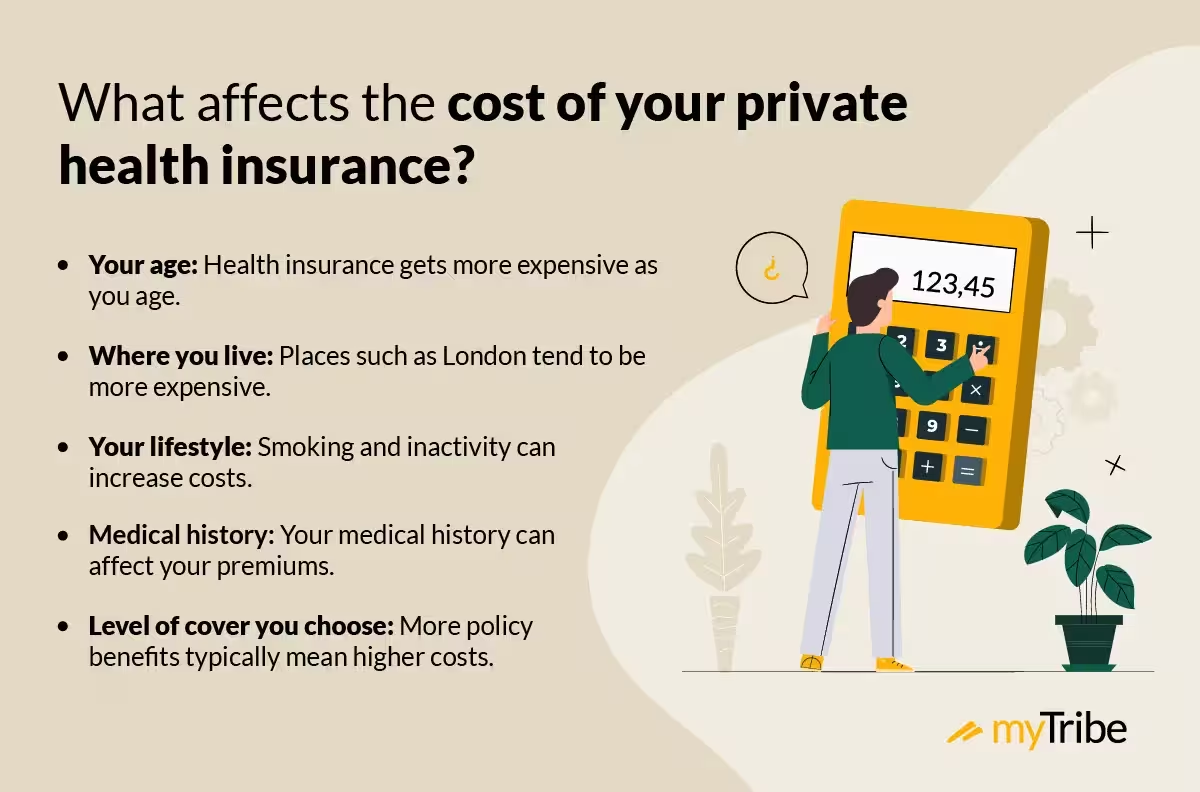When is it worth paying more for health insurance?
If you've decided to invest in health insurance, you want to ensure you get the best value for your money. A basic policy offers many benefits, but it can be worth paying more to ensure your health insurance provides excellent value. This article looks at optional extras worth having.


How does health insurance work?
Private health insurance cover gives you access to private treatment for acute conditions that arise after you buy the policy. You can purchase private health insurance by researching different providers and contacting them to request a quote or by speaking to a broker who'll do the research for you and help you compare quotes when received.
Depending on your needs, you can choose a basic plan or add optional extras. When you're happy your chosen health insurance policy includes all the coverage you need, you'll pay regular insurance premiums for as long as you want your private health insurance to continue.
Related guides:
Every private health insurance policy includes some specialist treatment and services as standard. Basic policies are also known as 'treatment only' policies. This type of private health insurance gives you access to 24/7 virtual GP appointments, health advice helplines and counselling sessions, depending on what your provider offers. Many health insurance companies also have reward programmes offering member perks and product discounts.
The main treatment types and services you can expect to find are:
In-patient and day-patient treatment
If you need to be admitted for hospital treatment such as surgery, your private health insurance will likely cover it. Health insurance covers surgery in private hospitals or a private day patient unit, where you must stay there for a few hours but can return home at night.
Cancer treatment
Cancer care forms a core part of every health insurance policy. Most insurance providers cover treatments such as surgery, chemotherapy and radiotherapy. Others offer cutting-edge treatments not currently available via the NHS and additional services such as nutrition advice.
Limited out-patient care
Full out-patient treatment is usually only available as an optional extra. However, many private health insurance policies now include some limited out-patient cover. This can include out-patient surgeries, tests and scans or consultant appointments, so it's worth checking what's available when comparing private health insurance quotes.
Mental health support
Mental health coverage on a basic policy is typically limited, with providers offering up to eight counselling or CBT sessions. Some insurers provide specific helplines for general guidance or information about other support services. You'll often find self-help resources such as assessment tools or online articles. Other providers offer discounted services in their member reward programmes. For example, Vitality's rewards programme allows you to earn access to the Headspace mindfulness and meditation app.
Virtual GP appointments and telephone advice
A virtual GP lets you speak to a GP 24/7 via video or telephone consultation so you can arrange your appointment to fit around your other commitments.
Insurers also provide telephone helplines with various medical experts such as nurses, midwives, or pharmacists. These services vary between providers, so check if any service is significant to you.
Self-help resources
As mentioned, many health insurance policies include access to mental well-being self-help resources, but other tools are also available. Depending on your chosen provider, you may be able to access health and well-being apps. For example, AXA and Vitality offer access to the Peppy app, which provides fertility, pregnancy, early parenthood and menopause support.
Member perks and discounts
Most health insurers now offer a membership scheme providing perks such as free coffee and discounts on gym memberships, cinema tickets and holidays. Some rewards are included as standard, while you must earn others through activity and healthy living.
It makes private health insurance worth having as you can save money, and some schemes incentivise you to improve your health.
Adding optional extras can give you a more comprehensive private medical insurance policy.
These can include:
- Full out-patient treatment, including diagnostic tests.
- A more comprehensive range of therapies and treatments.
- More treatment sessions.
- Enhanced mental health cover.
- Dental and optical cover.
- An extended hospital list to give you more choice about where you're treated.
Adding more coverage to your policy increases your health insurance premiums. Before you invest, consider your private medical insurance priorities and how additional benefits will help you achieve them. Adding coverage to your health insurance can help you save money elsewhere.
Here are some optional extras to consider depending on your circumstances.
Out-patient treatment
Private health insurance only covers out-patient treatment if you add it to your policy. However, many insurance providers now include some out-patient services in their core policies.
It covers various treatments, from consultant appointments, tests, and scans to physiotherapy or other care that doesn't require hospital admission. In some cases, insurance providers offer separate cover for diagnostics and therapies so you can tailor your private health insurance to meet your needs.
Diagnostic tests
Suppose your private health insurance doesn't include diagnostic tests. In that case, you'll need to go via the NHS to get your diagnosis and ask your consultant for a private referral so you can use your health insurance to have surgery. Private medical insurance coverage for tests typically also includes an appointment with a consultant to give you a private diagnosis.
We always recommend adding this type of cover to your private health insurance as it helps you get the most out of your policy. NHS waiting lists are lengthy, and out-patient coverage lets you skip the waiting list, get a quick diagnosis, and have a seamless transfer to private treatment. A faster diagnosis can make a real difference if your condition would benefit from early treatment or seriously impacts your quality of life.
Therapies cover
Some health insurance providers offer separate coverage for physical therapies such as physiotherapy, osteopathy or chiropractic treatment. Others include physiotherapy in a single out-patient treatment category, so it's worth checking your health insurance quotes to see what's included.
If you want complementary or alternative therapies such as homoeopathy, acupuncture or reiki, you'll likely need to add suitable coverage to your policy. Providers vary in the types of treatment covered by private health insurance; one provider may offer reiki at an additional cost, while others won't cover it at all. If you have particular treatments you want your private health insurance to cover, check to see what your chosen providers offer.
Additional treatment sessions
Suppose your insurance provider offers some physiotherapy or other treatment sessions as part of their core health insurance policies. In that case, there will typically be a limit to the number of sessions you can access. You may have to pay for additional private medical care or wait for NHS treatment if you need more.
Alternatively, you can add further sessions to your private health insurance. This is ideal for people with active hobbies who use private physiotherapy as part of their routine health maintenance or want to access a longer course of treatment to aid their recovery if they sustain injury.
You live in London or a major city
Private health insurance providers include a standard hospital list with each policy. A health insurance provider may have their own hospital network. In contrast, others cover treatment in various facilities, meaning you could have private health care in a unit at an NHS hospital.
Private care costs vary depending on location, as healthcare costs are higher in central London and other major cities. When comparing health insurance quotes, check which hospitals your insurance covers in your area. You'll get more out of your health insurance if you can access convenient treatment at a hospital close to your home or workplace.
If you live in central London or another major city, it can be worth paying for an extended hospital list covering hospitals with higher treatment costs so you can get to appointments easily or spend less on travel costs.
You already pay for dental or optical care
If you don't qualify for free dental check-ups or eye tests and pay privately for dental or optical care, adding dental and optical cover to your private health insurance could help you save money. If you have an existing dental plan with your dentist, this will likely cover routine check-ups but may only offer a discount on emergency treatment or other dental care such as fillings or crowns. Depending on your chosen policy, dental cover can pay for your treatment in full.
Optical health insurance can also cover glasses and contact lenses if you need them for the first time or if your prescription has changed since your last eye test.
You have a stressful job
If you work in a stressful environment, your employer may already provide private health insurance with access to psychiatric treatment or an employee assistance programme offering ad hoc counselling.
However, you can add enhanced coverage to your private health insurance if they don't. Many private medical insurance policies provide limited counselling or CBT sessions in their core coverage. Additional coverage increases the number of available sessions and covers private in-patient, day-patient and out-patient psychiatric treatment if needed.
Even if you choose to enhance your private health insurance with additional benefits, there are some conditions your policy won't cover. Private medical insurance covers acute conditions that a course of treatment can cure. Your private health insurance provider will have a list of standard exclusions, while others are based on your medical history.
Chronic illnesses
Private health insurance doesn't cover chronic illnesses, so if you have any chronic conditions such as asthma, diabetes or high blood pressure, you'll need to see your GP or consultant for free healthcare, including ongoing monitoring. Private healthcare providers are set up to treat conditions with a known cure rather than those that need long-term care.
Pre-existing conditions
Pre-existing medical conditions are illnesses or conditions that you had medical treatment or advice for during the five years before you bought your private medical insurance policy. For example, say you had physiotherapy to treat knee pain a year before taking out private health insurance. If the pain returns a year after you buy health insurance and your GP refers you for a knee replacement, your private health insurance won't cover the surgery.
However, your insurer can add pre-existing conditions to your private health insurance if you stay symptom-free for the first two years of coverage. Private medical insurance can also help you get a diagnosis if you aren't sure whether your symptoms relate to a pre-existing condition.
Standard exclusions
Each private health insurance provider has a list of standard exclusions setting out treatments and private healthcare which the policy won't cover, regardless of your medical history. These can vary widely between different medical insurance providers. Many insurers exclude medical treatment for addiction as standard, while some include it as part of their mental health coverage.
Typical standard exclusions include:
- Emergency treatment
- Medical treatment for straightforward pregnancy and birth (although complications are often covered)
- Cosmetic surgery or weight loss treatment
- Behavioural or developmental conditions such as autism or ADHD
- Intensive care
- Allergy treatment
Private health insurance plans vary, so always check the small print before buying.

Your private health insurance cost depends, in part, on the level of coverage you choose. However, other factors also influence the cost of private health insurance, many of which are out of your control.
Your age
Insurance companies assess the risk you'll make a claim when deciding health insurance premiums. Our risk of ill health increases as we age, meaning we're more likely to claim for private medical treatment. Accordingly, the older you are when you buy private medical insurance, the higher your monthly premium will be.
Where you live
As previously mentioned, the cost of private healthcare is higher in London and other large cities. Private healthcare costs vary across the UK, and your postcode can influence your premiums in other ways, depending on the level of claims in your area and how many people have health insurance policies.
Some insurers don't use postcode-dependent pricing, so it's worth getting a quote if you live in a traditionally expensive area. However, you should still ensure they offer the private healthcare coverage you need.
If you've claimed on health insurance before
This won't be relevant if you've never had private health insurance. However, insurers will look at your claims history if you're transferring to a new provider. You'll benefit from a no-claims discount if you have your policy for a few years without claiming. However, premiums will likely rise if you claim on your private health insurance.
How much private treatment costs
We've previously mentioned that private healthcare costs vary depending on your location. However, they also increase over time as wages, rents, and utility bills rise. This affects the cost of private healthcare and NHS services.
How many claims your insurer pays out
Different insurance companies take varying approaches to risk assessment, but their costs can also depend on how many claims they receive and pay. A large insurance company may be able to spread the cost of private healthcare claims over a more extensive customer base. Still, smaller insurers may receive fewer claims, so it's worth getting quotes from various companies to see how they measure up.
Whether you smoke
Smoking, vaping, or using other nicotine products can increase your risk of ill health and your health insurance cost. In some cases, you may pay twice as much as a non-smoker for your health insurance cover. The cost can be higher even if you're using a vape or other nicotine replacement products to give up smoking.
When you contact a health insurance company or a broker for a quote, they'll ask for details about how much you smoke and how long you have smoked to assess your risk. Your premium may start to drop if you haven't smoked or used any other nicotine products for at least 12 months, but your premiums will likely remain higher until you've been nicotine-free for around five years.

At MyTribe, we aim to help you learn more about business health insurance so you can make an informed choice. However, speaking with a specialist broker gives you advice tailored to your circumstances. Contact us today for a comparison quote, and we'll put you in touch with a regulated, high-quality broker for bespoke advice.
Disclaimer: This information is general and what is best for you will depend on your personal circumstances. Please speak with a financial adviser or do your own research before making a decision.








